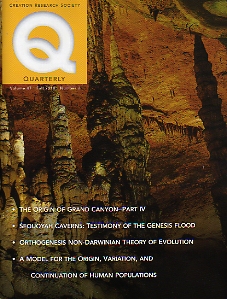by Jerry Bergman
CRS Quarterly, Volume 47, Number 2
Fall 2010, pp. 139-145.
Abstract:
Orthogenesis is the theory that evolution occurs in a straight line, not branching, and is internally goal-directed. The theory was an attempt to explain the source of new genetic information in biological evolution. Although the theory boasted a number of prominent supporters, it did not survive scientific scrutiny and is now effectively moribund. The main problem with orthogenesis was that no plausible mechanism to drive straight-line evolution was ever demonstrated, and all of the examples used to support orthogenesis could be explained by other theories. Today the most widely accepted theory concerning the source of new genetic information is gene mutations. But mutation is regarded by some prominent biologists as an inadequate source of genetic novelty. It is important to study the doctrine of orthogenetic evolution because it prepares us to understand what may very well happen to the mutation-based evolutionary theory in the future.
pdf of article


